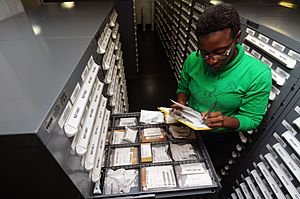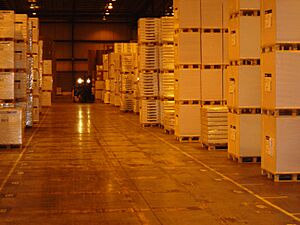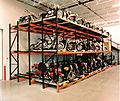Logistics facts for kids
Logistics is all about managing how things move. It's the process of planning, carrying out, and controlling the flow of things like materials, equipment, and even information. The goal is to get these items from where they start to where they need to be, making sure they arrive at the right time and place to meet specific needs, like for customers or companies.
Logistics often involves combining different steps. These include handling materials, making products, packaging them, keeping track of what's in stock (inventory), transporting items, and storing them in warehouses. Security is also a big part of it. Special computer programs can help plan and improve logistics, aiming to use as little time and as few resources as possible.
Contents
Main Goals of Logistics
Logistics is a key part of how a company works. Its main goals can be split into two groups: those about performance and those about cost.
Some performance goals are:
- Making sure things arrive on time.
- Having short delivery times.
Some cost goals are:
- Keeping low levels of stored items (inventory).
- Using all available space and machines efficiently.
Sometimes, when making decisions, companies have to choose between these goals. For example, getting something delivered super fast might cost more.
Different Views of Logistics
Logistics can be looked at from different angles, depending on where the items are moving.
Inbound Logistics
This is about bringing things into a company. It focuses on buying and arranging the movement of materials, parts, or finished products from suppliers. These items then go to factories, warehouses, or stores.
Outbound Logistics
This is about sending things out from a company. It deals with storing and moving the final products and their information. This process goes from the end of the production line all the way to the customer who will use the product.
Types of Logistics
Logisticians perform many services, and these can be grouped into different fields:
- Procurement logistics
- Production logistics
- Distribution logistics
- Disposal logistics
- Reverse logistics
Procurement Logistics
This type of logistics involves activities like researching the market, planning what's needed, deciding whether to make or buy something, managing suppliers, and placing and tracking orders. The goals here can sometimes conflict. For example, a company might want to save money on buying supplies but also needs to make sure the supply process is very secure.
Production Logistics
Production logistics connects the buying of materials (procurement) with sending out finished products (distribution). Its main job is to use the available production machines and spaces to make the products that are needed for distribution. This includes planning how the factory is set up and how production is managed.
Distribution Logistics
The main task of distribution logistics is to deliver finished products to the customer. This involves processing orders, storing items in warehouses, and transporting them. Distribution logistics is important because products are made at a different time, place, and in different amounts than when and where they are used by customers.
Disposal Logistics
This type of logistics focuses on reducing costs and improving services related to getting rid of waste that a business creates.
Reverse Logistics
Reverse logistics is all about operations that involve reusing products and materials. This includes managing and selling extra items or products that customers return to the company.
Military Logistics
In the military, keeping your own supplies moving while stopping the enemy's supplies is extremely important. An army without resources and ways to transport them can't defend itself. It's a crucial part of military strategy.
Business Logistics
One way to describe business logistics is "having the right item in the right quantity at the right time at the right place for the right price in the right condition to the right customer." Logistics aims to manage how projects are completed and how supply chains work efficiently.
Logistics Management
Logistics management is the part of the supply chain that plans, carries out, and controls the smooth and effective movement and storage of goods and services. This includes both sending things out and bringing them back. It also manages all the related information, from where items start to where they are used, to meet customer and legal needs.
Many different job titles are used for people working in logistics, such as:
- Materials management
- Channel management
- Distribution
- Supply-chain management
The Chartered Institute of Logistics and Transport (CILT) was started in the United Kingdom in 1919. It's one of the groups that offers professional training and degrees in logistics management.
Warehouse Systems
There are two main types of systems used in warehouses:
- Warehouse Management Systems (WMS) plan activities, often looking at weekly forecasts based on past data and trends.
- Warehouse Control Systems (WCS) act like a supervisor on the floor. They work in real time to get jobs done in the most effective way.
While they have some similar features, a WMS plans for the future, and a WCS manages what's happening right now.
Logistics Automation
Logistics automation means using computer software or automated machines to make logistics operations more efficient. This usually refers to tasks inside a warehouse or distribution center. Larger tasks are handled by supply chain management systems.
Logistics Outsourcing
Logistics outsourcing happens when a company works with a logistics service provider (LSP). This LSP offers more than just basic services. They provide customized solutions, handle many different activities, and often work with the company for a long time, making it a strategic partnership.
Third-Party Logistics (3PL)
Third-party logistics (3PL) means using outside companies to do logistics tasks that a company used to do itself. For example, if a company that has its own warehouses decides to hire an outside transportation company, that's an example of 3PL.
Fourth-Party Logistics (4PL)
A fourth-party logistics (4PL) provider is like an organizer. They bring together resources, skills, and technology from their own company and other companies to design, build, and run complete supply chain solutions. While a 3PL provider usually focuses on one specific task, a 4PL manages the entire process. You can think of a 4PL as a general contractor who manages other 3PLs, truckers, and customs agents, taking responsibility for the whole process for the customer.
Emergency Logistics
Emergency logistics is a special type of transport used to move goods or items very quickly when there's an emergency. This might be because of a delay in production, or an urgent need for special equipment. For example, it's used to get parts quickly to prevent an airplane from being stuck on the ground (called "aircraft on ground" or AOG). These services are usually provided by specialized companies.
Logistics as a Job
A logistician is a professional who works in logistics. Many professional logisticians get certified by special associations. You can work for a company that focuses only on logistics, like a shipping line, an airport, or a freight forwarder. Or, you can work in the logistics department of a company that makes or sells products. Since logistics covers many areas like buying, making, distributing, and disposing of things, there are many different career paths.
A newer trend in the industry is 4PL firms, which are consulting companies that offer logistics services. Some universities and academic institutions train students to become logisticians, offering programs for both undergraduate and postgraduate studies.
Images for kids
-
Punjab Regiment uses mules to carry supplies in Burma during WWII.
See also
 In Spanish: Logística para niños
In Spanish: Logística para niños
 | Selma Burke |
 | Pauline Powell Burns |
 | Frederick J. Brown |
 | Robert Blackburn |











